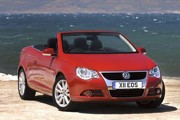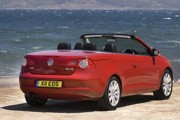Review
You’ve failed to deliver the goods on time to the client, they’ve shouted at you during a meeting, demanding thousands in recompense, and your boss is ordering you to stand firm as it wasn’t your fault.
Then you’ve got to pick the kids up by 5pm from their after-school club, cook dinner, pay some bills, clear up and do it all over again the next day. Working is tough.
According to the Health and Safety Executive, more than five million people report being extremely stressed at work in the UK each year.
That’s a serious duty-of-care issue.
Now, before you stop reading, thinking “here we go with another warning of what I should be doing for our spoon-fed employees”, read on.
Can a company car be the answer to some of that stress? I was thinking this as I wafted along in a Volkswagen Eos in the spring sunshine, listening to the birds, smelling the grass, with the wind dancing through what little hair I’ve got left.
This is the new 122bhp 1.4-litre TSI-engined Eos, which differs from other TSI engines in that it uses only a turbocharger, and eschews the extra grunt afforded by the supercharger in higher power models.
The lowest-powered engine in the Eos range delivers CO2 emissions of 159g/km and combined fuel economy of 42.2 mpg. It replaces the 1.6 FSI, which had 115bhp with emissions of 181g/km and fuel economy of 37.2mpg. So all the figures are going in a positive direction.
The Eos has never been a sprightly beast, though, in any but its most powerful form.
The extra weight caused by the roof’s numerous motors and the inherently comfort-based chassis of Volkswagens of this size never gave it a chance of being a great drive.
The steering feels depressed and lethargic, while the chassis’s main claim to fame is that it doesn’t shiver every time it goes over bumps.
Add in the dull acceleration from its 122bhp and you’ve got a car with all the dynamism of a lazy Sunday brunch on the patio.
But that’s exactly what the Eos is all about. It’s a car to drop the roof down, put your feet up, read the Sunday Times with a cup of tea and toast and soak up the sun.
The cabin is high quality and very comfortable, and there’s decent room in the back for the kids.
And that roof is still a work of art as it folds away.
Only the small boot detracts.
While many fleets have a no convertible policy, perhaps the likes of the Eos should be considered as an addition to the choice list.
Life is busy and chaotic and full of nervous energy and missed deadlines and shouty bosses.
The Eos is the perfect antidote to all that working stress, lulling you along the road with a relaxed demeanour, the chance to top up your tan and forget about all those worries.
Positive:
Great image
Relaxing
Good running costs
Negative:
Slow
Small boot
Expensive
THREE RIVALS TO CONSIDER
Ford Focus CC-1 1.6
MINI One Convertible 1.6 Sidewalk
Vauxhall Astra TwinTop 1.6 Sport
P11D PRICE
We’ve focused on the lowest emission models of these ranges, which means there is a large disparity in price. The Focus is extremely keenly priced, the MINI is small but desirable whereas the Astra is a superb package. Eos is more expensive at the front end.
Focus: £16,580
MINI: £16,725
Astra: £17,980
Eos: £19,800
EMISSIONS AND TAX RATES
The BIK banding of the new 1.4 TSI engine in the Eos helps makes up for its high front-end price. The Focus is the cheapest in tax, at £1,326 a year for a 40% taxpayer, but there is less than £100 a year difference between it and the most expensive, the Eos.
Eos: 159g/km/18%
Astra: 163g/km/19%
MINI: 168g/km/20%
Focus: 169g/km/20%
SMR COST
Long gone are the days when it was feared that convertibles cost more in SMR than their conventional counterparts. All of these models can be looked after cheaply and the roofs are generally very reliable and watertight. However, you might need to locate a dealer with specialist expertise if things go wrong.
ppm/60k total
Focus: 2.91/£1,746
Astra: 3.07/£1,842
MINI: 3.17/£1,902
Eos: 3.71/£2,226
FUEL COST
Convertibles, carrying all that extra weight, are never going to be spectacularly efficient, but 40-plus mpg figures for all cars except the Focus is still a good performance. If you are really concerned about fuel bills, the Eos, Astra and Focus also offer diesel variants.
ppm/60k total
Eos: 11.23/£6,738
Astra: 11.42/£6,852
MINI: 11.73/£7,038
Focus: 11.91/£7,146
DEPRECIATION COST
The MINI is the champion when it comes to depreciation, losing slightly more than half its value. The Astra loses the most but still performs decently while the Eos puts in a strong performance. These cars are still desirable on the used market, especially at this time of year.
ppm/60k total
MINI: 15.25/£9,150
Focus: 17.30/£10,380
Eos: 17.58/£10,548
Astra: 19.92/£11,952
WHOLELIFE COST
Thanks to its superb residual values, the MINI is the lowest in wholelife cost terms. Despite its high front-end price, the Eos ticks all the boxes and proves to be very competitive, nearly matching the Focus which is £3,400 cheaper to start with. The Astra’s depreciation puts it fourth.
ppm/60k total
MINI: 30.15/£18.090
Focus: 32.12/£19,272
Eos: 32.52/£19,512
Astra: 34.41/£20,646
VERDICT
How difficult is this?
The MINI Convertible is the cheapest to run and a poseur’s dream, but is tiny inside and sparsely equipped.
The Astra is probably the best all-rounder with a decent drive, big boot and metal roof but is on the expensive side in wholelife cost terms.
The Focus stacks up well in cost terms but looks odd thanks to its elongated boot area – a major flaw in a convertible.
The Eos puts up a good showing on running costs, looks great and comes with a great image, but is the most expensive in terms of driver benefit-in-kind tax.
However, it won’t cost drivers that much more a month than the rest, which makes it our winner.
- WINNER: Volkswagen Eos 1.4 TSI


















